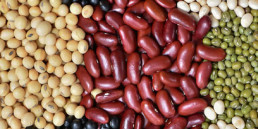VALERECO is a new project funded under the Horizon Europe Program. The project brings together a diverse consortium of 15 partners from 11 countries and officially commenced with a successful Kick-Off meeting in Athens, Greece.
During the kick-off meeting on 17 and 18 June 2024, a public launching event was hosted to present and raise issues related to the project’s goal, such as productive, climate-neutral, environment-friendly, and resilient farming systems.
VALERECO aims to highlight legumes’ often overlooked benefits and encourage their integration into cropping systems, supporting environmental sustainability in agricultural productivity.
The primary objective is to promote understanding and adoption of legume crops in agriculture by quantifying and enhancing the environmental and economic value of the Ecosystem Services (ES) offered by legume crops. The project will promote farmers’ and agricultural advisers’ knowledge and capacity to include eight major and four minor legume crops in their cropping schemes while raising awareness of the positive ecological and economic impact.
As Prof. Ilias Travlos, the project coordinator, states that “in the era of biodiversity loss, climate change and food safety at risk and given the present spotlight on legumes on EU research and policy, our ambition is to valorize legumes and their ecosystem services and to suggest and evaluate realistic and sustainable ways of legumes’ inclusion into diverse cropping systems”.
Why Legume Ecosystem Services are important?
Incorporating legumes into cropping systems offers significant benefits, including improved soil health, enhanced biodiversity, and reduced need for synthetic fertilizers. However, many farmers often underestimate or are unaware of these benefits.
VALERECO will deliver and measure the important ES provided by legumes in different cropping systems. This includes major crops used for food or feed, as well as subsidiary crops like cover crops or living mulch. The project will assess three major pulses (soybean, pea, chickpea), five major forages (vetch, clover, white clover, red clover, lucerne), one minor forage (sulla), and three minor grain legumes (lupins, faba bean, lentil). These can be both annual and perennial and may be grown alone or in combination with other crops.
VALERECO adopts a comprehensive approach, summarized as Identify – Valorize – Disseminate legume Ecosystem Services (ES) to provide the knowledge, resources, and innovative solutions required for effective legume cultivation. This approach involves:
- Identification: Conducting thorough analyses of existing ecosystem services and exploring ways to integrate legumes into the new Common Agricultural Policy (CAP).
- Valorization: Establishing nine (9) Living Labs (LLs) across six (6) European countries to promote legume adoption through behavioural design strategies, participatory trials, and the demonstration of technical and economic solutions.
- Dissemination: Creating a Digital Legume Information Hub (DLIH), a Decision Support System (DSS), and an E-learning platform to enhance knowledge transfer and support decision-making for farmers and advisors.
VALERECO engages multiple stakeholders, including farmers, agricultural advisors, researchers, industry stakeholders, policy makers, and consumers, in co-creation activities and demonstration events to showcase the potential of legumes-based diversified farming systems in VALERECO LLs. In addition, it will provide policy recommendations and work closely with national and international projects, networks, and organizations to ensure that the capacity-building material reaches a wide audience and can be scaled up.
Partners:
- Agricultural University of Athens
- Burgundy School of Business
- Delphy
- University of Coimbra
- Foodscale Hub
- Institute of Field and Vegetable Crops
- Leibniz University Hannover
- Stichting Wageningen Research
- Instituto Navarro de Tecnologias e Infraestructuras groalimentarias
- AgriFood Lithuania DIH
- University of Florence
- University of Pisa
- AgFutura Technologies
- Scuola Superiore Sant’Anna
- Helvetas
Project website: https://valereco.eu/


